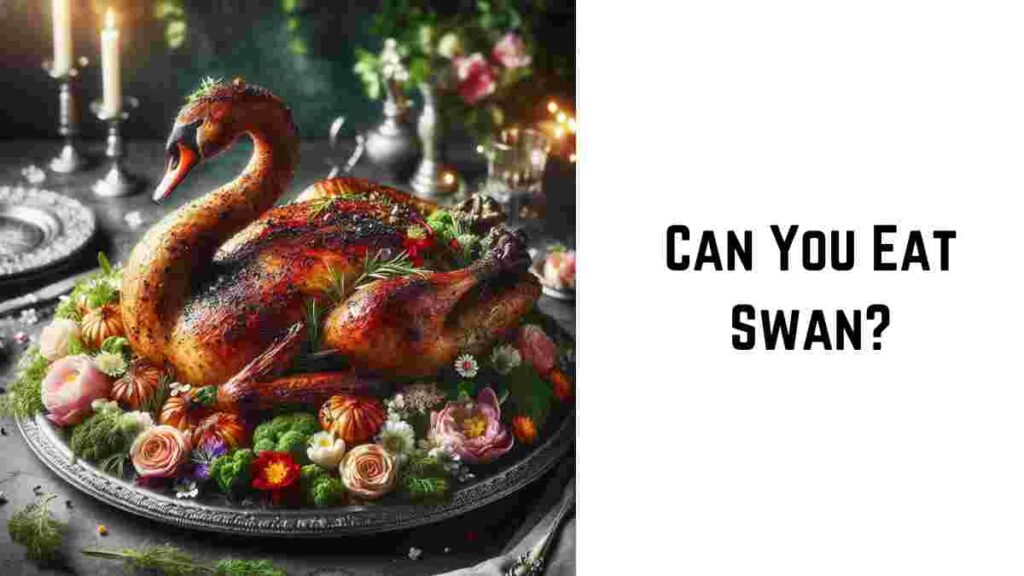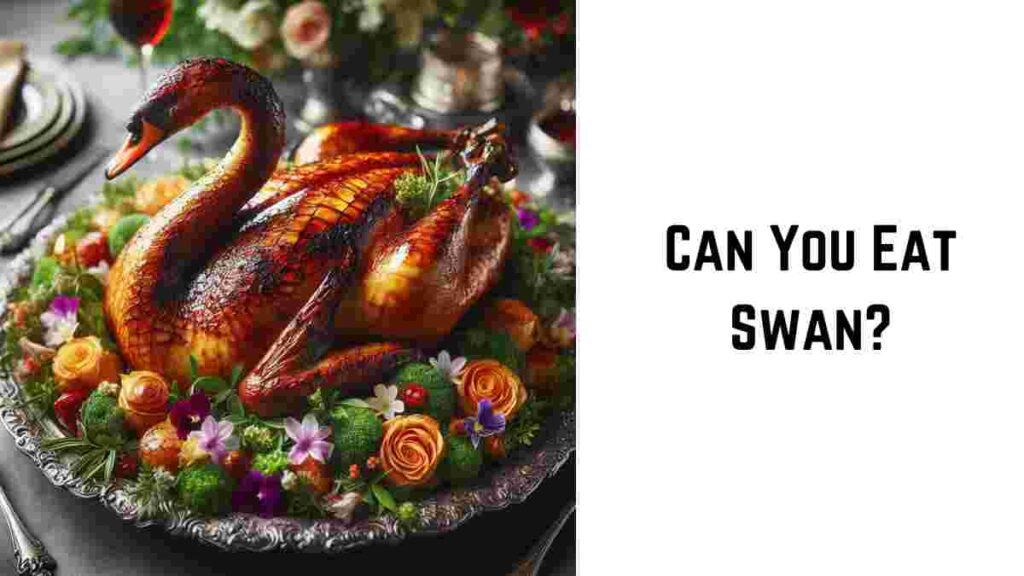Can You Eat Swan: Swans, with their graceful elegance and regal appearance, have long captured the imagination of people around the world. Often associated with beauty and tranquility, these majestic birds have also piqued curiosity regarding their culinary potential.
The question arises: can you eat swan? This article delves into the historical, cultural, and ethical aspects surrounding the consumption of swan meat, exploring both its appeal and the controversies it evokes.
Find the best food for your chickens

Table of Contents
A Brief History of Swan Consumption – Can You Eat Swan?
Can You Eat Swan: Throughout history, swans have been consumed in various cultures, primarily in Europe and Asia. In medieval Europe, swans were considered a delicacy reserved for royalty and nobility. They were often hunted during grand feasts and banquets as a symbol of status and extravagance. For instance, during the reign of Elizabeth I in England, swans were protected by law and were only allowed to be consumed by the monarchy and certain privileged individuals.
In Chinese cuisine, swan meat has also been historically consumed, though it was more prevalent in the past and is less common today due to conservation efforts and changing cultural norms.
Culinary Appeal and Nutritional Value – Can You Eat Swan?
Swan meat is known for its distinctive flavor and texture. Descriptions often liken it to a cross between duck and goose, with a rich, gamey taste. The nutritional profile of swan meat is similar to that of other poultry, with a high protein content and moderate fat levels.
Let’s take a closer look at the nutritional breakdown of swan meat compared to other commonly consumed meats, such as chicken and duck:
| Nutrient (per 100g) | Swan | Chicken (Broiler, Roasted) | Duck (Roasted) |
|---|---|---|---|
| Calories | 280 kcal | 239 kcal | 337 kcal |
| Protein | 25 g | 27 g | 19 g |
| Fat | 20 g | 14 g | 28 g |
| Saturated Fat | 6 g | 4 g | 9 g |
| Cholesterol | 80 mg | 88 mg | 84 mg |
| Iron | 3.5 mg | 1.2 mg | 2.7 mg |
| Vitamin B12 | 1.5 µg | 0.3 µg | 0.4 µg |
| Zinc | 2.1 mg | 1.0 mg | 1.9 mg |
(Note: Specific values can vary and should be verified through scientific sources.)
Notes:
- Calories: Swan meat has a higher caloric content compared to chicken but lower than duck, reflecting its rich, gamey nature.
- Protein: Chicken is slightly higher in protein, but swan also provides a substantial amount.
- Fat: Swan meat is fattier than chicken but leaner than duck, which has the highest fat content among the three.
- Saturated Fat: Both swan and duck have higher saturated fat compared to chicken.
- Cholesterol: All three types of meat have comparable cholesterol levels.
- Iron: Swan meat is particularly rich in iron, making it a notable source of this essential mineral.
- Vitamin B12 and Zinc: Swan meat provides a good amount of Vitamin B12 and zinc, essential for various bodily functions.

Ethical Considerations and Conservation Efforts
Despite its historical consumption, the idea of eating swan meat today raises significant ethical concerns and challenges. Swans are often viewed as symbols of beauty, grace, and tranquility, which makes the thought of consuming them unsettling for many people. Furthermore, many species of swans are protected under national and international conservation laws due to declining populations and habitat loss.
Conservation efforts have been crucial in protecting swan populations worldwide. For example, the Mute Swan in Europe has been protected under various wildlife laws and conservation initiatives due to its vulnerability. Consuming swan meat, therefore, raises ethical dilemmas regarding the impact on wild populations and whether it aligns with sustainable and responsible culinary practices.
Legalities and Cultural Perspectives
The legality of consuming swan meat varies across different countries and regions. In some places, such as the United Kingdom, swans are protected under the Crown and are illegal to hunt or consume without special permission. In contrast, there are countries where swan hunting and consumption are allowed under certain conditions and regulations.
Culturally, attitudes towards eating swan meat have evolved over time. While it was once a symbol of prestige and luxury, modern sensibilities often lean towards protecting wildlife and preserving species diversity. This shift in perspective reflects broader changes in environmental consciousness and ethical considerations regarding animal welfare.
Culinary Practices and Recipes
For those intrigued by the culinary aspect of swan meat, historical recipes provide insights into how it was traditionally prepared and enjoyed. In medieval Europe, swan was often roasted whole and served with elaborate garnishes and sauces. The meat was prized for its tenderness and unique flavor, making it a centerpiece of extravagant feasts.
Here’s a simplified recipe inspired by historical preparations:
Roast Swan with Wild Berry Sauce
Ingredients:
- 1 whole swan, plucked and cleaned
- Salt and pepper to taste
- 2 cups mixed wild berries (such as blackberries, raspberries)
- 1 cup red wine
- 1 tablespoon honey
- Fresh herbs (rosemary, thyme) for garnish
Instructions:
- Preheat the oven to 350°F (175°C).
- Season the swan inside and out with salt and pepper.
- Place the swan on a roasting rack in a roasting pan. Roast in the oven for about 2.5 to 3 hours, basting occasionally with its own juices.
- In a saucepan, combine the wild berries, red wine, and honey. Simmer over low heat until the berries break down and the sauce thickens.
- Serve the roasted swan with the wild berry sauce drizzled over it. Garnish with fresh herbs.

Conclusion – Can You Eat Swan?
The question “Can you eat swan?” encompasses a complex tapestry of history, culture, ethics, and culinary intrigue. While swan meat has a storied past as a delicacy fit for royalty, its consumption today raises significant ethical and conservation concerns. Modern attitudes towards wildlife protection and sustainable practices urge us to reconsider the consumption of swans and other protected species.
Ultimately, whether one chooses to explore swan meat as a culinary curiosity or abstain out of ethical considerations, the discussion surrounding its consumption encourages a deeper reflection on our relationship with wildlife and the environment. As we navigate these conversations, we must strive for a balance that respects cultural heritage, promotes ethical stewardship of wildlife, and preserves the natural beauty that swans embody.
In the end, while you can eat swan meat in some places under specific circumstances, the broader question remains: should you?
FAQ – Can You Eat Swan?
Is it legal to eat swan meat?
The legality of eating swan meat varies by country and region. In many places, such as the United Kingdom, swans are protected under the Crown and it is illegal to hunt or consume them without special permission. In other regions, certain species of swans may be hunted and eaten under regulated conditions. Always check local wildlife laws and regulations before considering swan consumption.
What does swan meat taste like?
Swan meat is often described as having a rich, gamey flavor, similar to a cross between duck and goose. It is known for its distinctive taste and tender texture when cooked properly.
Are swans endangered?
Some species of swans are considered vulnerable or endangered due to habitat loss, pollution, and hunting pressures. Conservation efforts are in place in many parts of the world to protect these species and their habitats. For example, the Mute Swan is protected in Europe and North America.
Can you buy swan meat in stores or restaurants?
Swan meat is not commonly available in stores or restaurants, particularly in places where swans are protected by law. In regions where hunting and consuming swan meat is legal, it might be possible to find it through specialty suppliers or local hunters, but this is rare.
What is the nutritional value of swan meat?
Swan meat is high in protein and has a moderate fat content, similar to other types of poultry such as duck and goose. The exact nutritional profile can vary depending on the species and diet of the swan.
Are there ethical concerns about eating swan meat?
Yes, there are significant ethical concerns regarding the consumption of swan meat. Swans are often seen as symbols of beauty and grace, and many people find the idea of eating them unsettling. Additionally, with many species protected by law, consuming swan meat can raise issues related to wildlife conservation and animal welfare.
What are some traditional ways to prepare swan meat?
Historically, swan meat was often roasted whole and served during grand feasts in medieval Europe. Traditional recipes might include garnishes and sauces made from fruits and herbs. One example is a roasted swan with a wild berry sauce, which combines the rich flavor of the meat with the tartness of the berries.
Can swan meat be a sustainable food source?
Due to the protected status of many swan species and the ethical concerns surrounding their consumption, swan meat is not considered a sustainable food source. Focusing on more commonly farmed and sustainable poultry options, such as chicken and duck, is generally recommended for those looking to support ethical and sustainable eating practices.
Are there any health risks associated with eating swan meat?
As with any wild game, there can be health risks associated with eating swan meat, particularly if it is not properly handled or cooked. Potential risks include exposure to diseases and parasites. It is important to follow proper food safety guidelines and regulations when preparing and consuming wild game.
How do cultural perspectives on eating swan meat vary?
Cultural perspectives on eating swan meat vary widely. In medieval Europe, swan was a symbol of luxury and was consumed by royalty. In modern times, cultural attitudes have shifted towards protecting wildlife and preserving species diversity, making the consumption of swan meat less common and often frowned upon. Some cultures in Asia have historically consumed swan, though this practice has also declined with increased conservation awareness.
What should I do if I encounter swan meat being sold or served illegally?
If you encounter swan meat being sold or served illegally, it is important to report it to local wildlife authorities or law enforcement agencies. Consuming protected species is not only unethical but also illegal in many places, and reporting such activities can help protect wildlife populations and uphold conservation laws.
